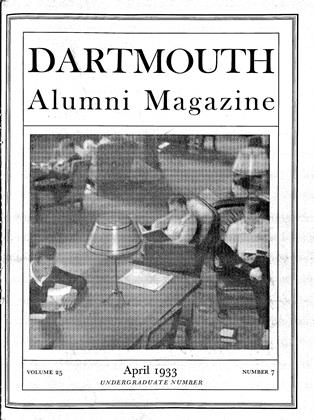The burden of proof in the prohibition controversy "is in process of being shifted from those who have held prohibition to be desirable to those who have thought that it was not," President Hopkins declared in a statement made to The Dartmouth in regard to recent Congressional action on the repeal amendment. The balance of power between fanatical drys and wets, Mr. Hopkins went on to say, is held by millions who are interested in principles of temperance, and these millions will watch closely to see whether such principles are really attained under repeal. In connection with repeal, the President declared that there should be "an intelligent and rigid control of the form that advertising of liquors may take and of the extent to which such advertising may be allowed to go." Repeal is by no means certain, he warned, and the assumption that the states will inevitably vote for the repeal amendment "is as fallacious as was the assumption two or three years ago tiiat it was impossible."
President Hopkins' complete statement follows:
"The indispensable first step towards repeal has been taken. However, there still remains necessary the affirmative action of thirty-six states before it can become operative. The assumption that such affirmative action is inevitable is as fallacious as was the assumption two or three years ago that it was impossible. The militant opposition is neither lacking in the strength that comes from conscientious conviction nor is it lacking in the practical experience that gives political acumen. A comparatively small proportion of population of the United States, if rightly distributed, can still prevent ratification.
"Assuming, however, that the determination of repeal ists continues and that their efforts are finally successful, a deep obligation will rest upon all who have opposed the Eighteenth Amendment to safeguard the new conditions. This remains true, whether it be argued from the point of view of public welfare or from that of those personally interested in the liquor traffic. It behooves the latter to remember that a people which has changed its mind twice within two decades can and may do it again. It is idle to assume that the transition from legal prohibition to legalized sale will be an easy one or one unattended with disturbing incidents. Constant watchfulness and a keen sense of public responsibility will be required to keep these as few as possible and to make their duration brief. Vicious lawlessness on the part of some, widespread disregard for the requirements of law on the part of many, and the evils attendant upon an almost complete disappearance among multitudes of any standards o£ temperance are not going to vanish overnight coincidently with the change in the law. Moreover, critical controversy may easily arise, unless common ground is early found upon which can stand those who have sponsored repeal because of desire for a new spirit of temperance and those who have sponsored it out of a desire for increased revenues. It is going to be difficult to make these two objectives live amicably together.
"Personally, I believe that there should be an intelligent and rigid control of the form that advertising of liquors may take and of the extent to which such advertising may be allowed to go. It is one thing to say that those who wish to drink should be allowed to do so without interference by the Federal Government but it is quite another to say that the skilled forces of persuasive propaganda should be turned loose to develop an ever increasing number of consumers of alcoholic liquors.
"The balance of power between the fanatical drys and the equally fanatical wets has been held by millions who have eventually come to believe that the principles of temperance could be better established among our people by repeal than such principles could be established under provisions of the Eighteenth Amendment. A host of these will watch with deep solicitude to see whether or not this becomes fact. If it is not made so, new restrictive legislation will inevitably follow, backed by public sentiment, which will make it much more drastically effective than prohibition has ever been capable of becoming lacking such backing. In other words, the burden of proof is in process of being shifted from those who have held prohibition to be desirable to those who have thought that it was not."
President Hopkins
 View Full Issue
View Full Issue
More From This Issue
-
 Article
ArticleDARTMOUTH MEN IN AVIATION
April 1933 By Carroll A. Boynton '33 -
 Class Notes
Class NotesClass of 1910
April 1933 By Harold P. Hinman -
 Article
ArticleHANOVER BROWSING
April 1933 By Rees Higgs Bowen -
 Article
ArticleNorthern April PART ONE
April 1933 -
 Class Notes
Class NotesClass of 1902
April 1933 By Hermon W. Farwell -
 Article
ArticleTHE UNDERGRADUATE CHAIR
April 1933 By J. S. Monacan'33.







